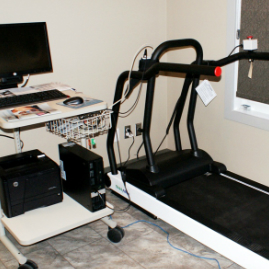Stress Testing
What is a stress test?
A stress test (or exercise ECG test) is used to determine how well your heart and lungs function during physical activity. During the test you will walk on a treadmill while your heart rate, blood pressure, and electrocardiogram (ECG) are monitored. As the test progresses, the level of exertion is gradually increased.
Why does it work?
During exercise the body requires more oxygen. As the level of physical activity increases, the heart has to work harder to deliver more oxygen - rich blood to the exercising muscles, so the heart beats faster. By monitoring the electrical signals of the heart as it beats faster, we can often see coronary problems that cannot be seen when the body is at rest. Because it is non-invasive, the stress test provides a safe and cost- effective initial test for coronary heart disease.
How do I prepare for the test?
You should not eat or smoke for at least two hours before the test. You can drink water. Continue to take your regular medication. You should wear comfortable sneakers or walking shoes, and exercise clothing, to the test.
What happens during the test?
A technician will attach ten disposable adhesives patches, or electrodes, on your chest. Before placing the electrodes, each electrode site will be cleaned with alcohol, then lightly abraded to remove oils and to ensure that a good electrical connection is made. Wires are then attached to each electrode. These wires conduct the electrical signals of the heart to the test system. A blood pressure cuff will also be placed on your arm, so that blood pressure can be measured during the test. After taking one or more resting ECG’s, you will move to the treadmill and start walking slowly. At regular intervals, the speed and elevation of the treadmill will increase. As the intensity of the exercise increases, your heart rate will increase. The test will be stopped if you experience dizziness, fatigue, or abnormal heart beats. Normally the exercise portion of the test will end when your heart rate has reached a target level (85% of a predicted maximum heart rate, based on your age). When the exercise portion of the test ends, you will still continue to walk slowly until your heart rate returns to normal. During this time your ECG data, along with blood pressure, will still be recorded. Then the wires and electrodes will be removed.
Are there any risks?
The exercise stress test carries a very slight risk (1 in 100,000) of causing a heart attack. All stress tests should be monitored by a health care professional. Immediately notify the attending health care professional if any of the following symptoms develop:
- » unsteadiness
- » grayish, cold, or clammy skin
- » dizziness
- » chest pain
- » irregular heart beat.

